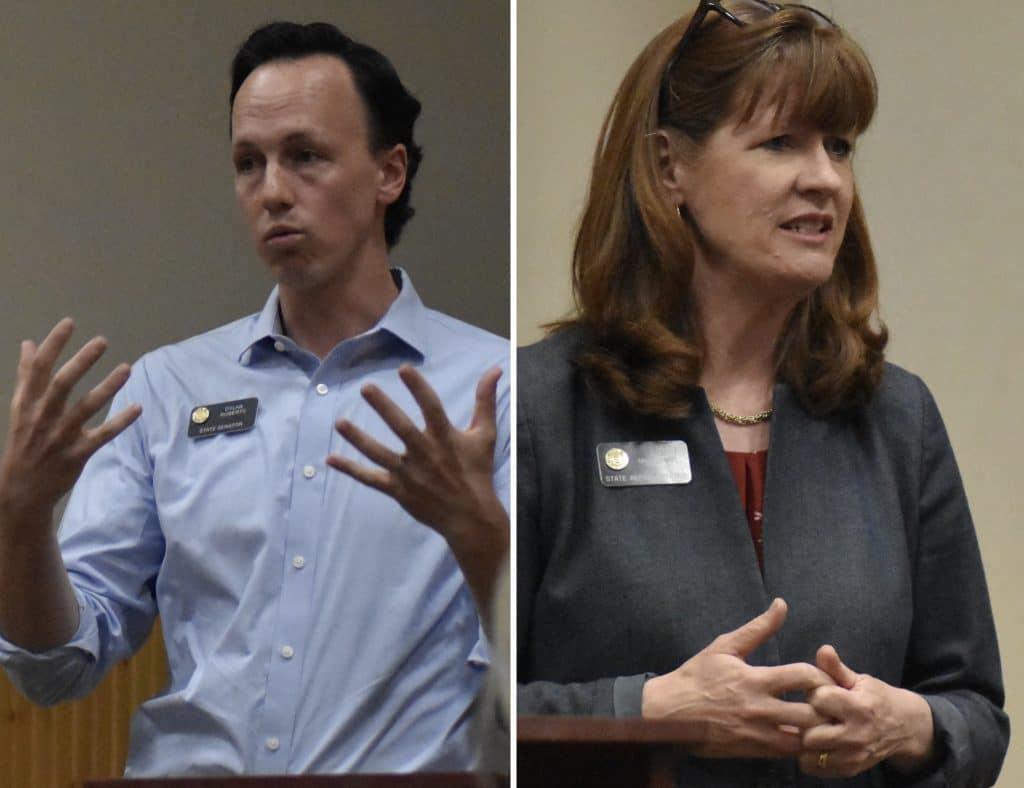Colorado House Speaker Julie McCluskie, Sen. Dylan Roberts tout 2023 legislative accomplishments

Following the end of the 2023 Colorado legislative session, Summit County’s two state representatives, House Speaker Julie McCluskie and Sen. Dylan Roberts, took a victory lap after passing a slew of bills targeting housing, water, education and more.
Speaking to a crowd in Frisco on Wednesday, May 31, the lawmakers touted a combined 32 bills they introduced and passed this session — along with dozens they helped sponsor.
“We saw a lot of bills around housing, which continues to be such a priority for all of us in this state,” said McCluskie, a Democrat and Dillon resident.
“This is an issue that’s personally important to me,” said Roberts, an Avon Democrat. “Every community is facing challenges with workforce and affordable housing, particularly here in our mountain and resort communities.”
Roberts said his inaugural Senate bill, the first to be introduced in the chamber this session, took a unique approach to help combat those challenges. It allows and incentivizes public-private partnerships to develop affordable housing on unused, state-owned land.
The legislation is already being put to work in Eagle County, where $2 million in funding has been set aside to support development on a parcel of state-owned land in Dowd Junction.
Another similar project recently broke ground in Frisco, where the town government and Colorado Department of Transportation are working to build 22 workforce housing units.
“This bill will allow local public-private partnerships to have access to that land at a very low or no cost and then build housing on it,” Roberts said. “So if you cut out the land cost, you’re going to save a ton of money on affordable housing projects and allow them to develop a lot more quickly.”
Roberts also introduced and passed a bill exempting certain low-income housing projects from property taxes and supported another that loosens local growth caps.
Two of the most sweeping and headline-grabbing bills, one to overhaul land-use control in towns and cities and another permitting local governments to enact rent control, died in the legislature. While he supported some of the land-use bill’s provisions, Roberts sought carve-outs for mountain communities and helped defeat the rent control bill while in committee.
While housing was a centerpiece for the 2023 legislature, water “is probably the most important issue facing our state over the next several decades,” Roberts said.
Senate Bill 177 pumps $95 million into new water conservation projects across the state, which Roberts called “the largest amount of money we’ve ever put into water in Colorado’s history in a single year.”
Senate Bill 295, a joint effort between Roberts and McCluskie, created a task force to propose legislative solutions to the drought-stricken Colorado River.
“Those of us on the Western Slope see the Colorado River as much more than just a waterway. For us, it’s our whole way of life,” McCluskie said, adding she hopes the task force can lead to “really good policy to secure our water future and that of the entire West.”
The legislation has faced some criticism from water experts and advocates who’ve called the measure “incremental” and “short on action,” according to reporting by The Colorado Sun and The Denver Post, respectively.

Robert Tann/Summit Daily News
On education, McCluskie said she was proud to pass House Bill 1246, which provides tuition-free community college for certain careers where “our state is seeing a workforce shortage.”
“That includes early childhood education, elementary education, firefighting and forest management, law enforcement, the construction trades, and nursing and health care,” McCluskie said.
The bill was modeled after legislation last year that provided free education for Coloradans pursuing critical health care roles, such as nursing aids and EMTs. According to McCluskie, the law led to a 20% increase in enrollment in those fields, helping to fill vital shortages in the workforce.
McCluskie also pledged that by next year the legislature will “fully buyoff” the budget stabilization factor, a Great Recession-era policy that has constricted state funding for public education for years.
Without it, McCluskie said K-12 schools will “finally be whole.” Colorado has consistently ranked near the bottom when it comes to public education funding.
One of the final bills passed this session was Senate Bill 303, which will send a ballot question to voters this November that could lower homeowners’ 2024 property tax bills.
The question, Proposition HH, would slightly reduce the statewide property tax assessment rate while exempting the first $50,000 of home value from taxation. Amid record-high home values, property taxes have skyrocketed for most homeowners across the state, with some of the largest hikes in mountain resort areas.
If passed, Proposition HH could help lower-income Coloradans, such as seniors living on fixed-incomes, receive “a greater benefit in their property tax reduction,” McCluskie said.
But it could also pose challenges for local governments and taxing entities, such as school districts, that rely heavily on property taxes for revenue. To mitigate this, McCluskie said the measure would set aside $200 million in state funding to help backfill a certain level of revenue loss.
“Ultimately, voters get to decide if this is the right approach to solving, or at least helping to minimize the impacts of rising property values,” McCluskie said.
Published on SummitDaily.com.
